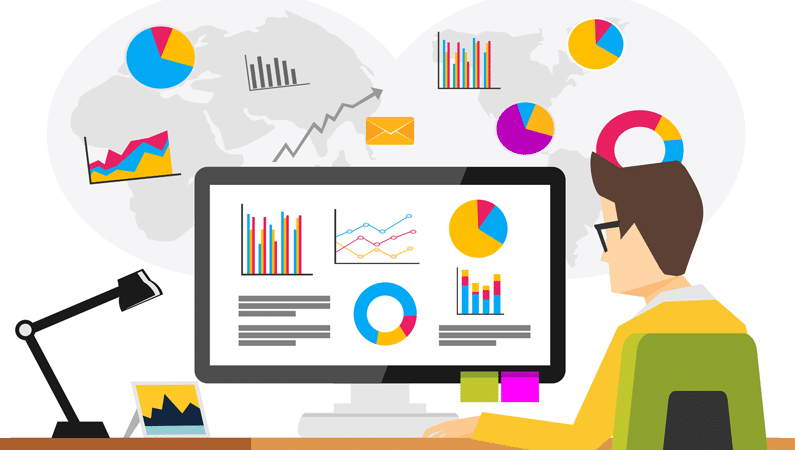Nowadays, no company can do without the use of data to ensure long-term growth . Thus, they must equip themselves with a genuine “data culture”. Data must make it possible to optimize and improve the performance of all of the company’s internal processes, where some of them are sometimes overwhelmed by the large amount of data.
What is data?
First, let’s take the time to define the data. In short, data is information digitized into a computer program . However, the difficulty is to extract value from it.
The goal is to transform data into information and information into ideas.
Carly FIORINA, formerly CEO of Hewlett-Packard (HP).
Then comes data intelligence, which tends to make data a useful resource in order to transform it into an authentic tool for competitive differentiation. But let’s first detail all the steps necessary for the proper use of data in a company.
How to effectively use data in business?
1 – Collect the right information
Before starting to collect data, it should be borne in mind that certain future decisions will be made on the basis of this data. Thus, it is essential to collect high quality information . Integrate this notion even before starting the data exploitation process to put in place the means to ensure qualitative collection.
It is also important to mention that data collection is not an end, but a tool . This tool makes it possible to meet all or part of one or more objectives. It is important to define marketing and/or sales objectives to know exactly what data you need and how it will be used.
A few objectives and indicators by way of example to illustrate my remarks:
- Improve customer satisfaction : evaluate the Net Promoter Score via satisfaction questionnaires.
- Develop sales of a product : follow-up of sales volume, margin generated, sales rate, etc.
- Increase the time spent on a website : bounce rate, views, number of users, number of sessions, CTR…

You must then prioritize the data to determine which are the most decisive for your business. There are two types of data:
- Quantitative : this data has a statistical significance, it makes it possible to confirm or invalidate hypotheses but also to make assumptions.
- Qualitative (descriptive): these data are difficult to measure numerically if they are not “recoded”, ie create new quantitative variables.
2 – Store and organize your data
After having made every effort to gather a maximum of good quality data, it is advisable to take care of it so as not to lose information. Protecting yourself against such a high risk therefore begins with the multiplication of backups (cloud, NAS, etc.).
The data can also be centralized on digital tools to facilitate future analysis. Companies generally use CRM (Customer Relationship Management) such as Salesforce or Hubspot for example.
3 – Analyze
After a rigorous work of collecting and storing the data, it is necessary to make the data speak despite a vast volume of information. This therefore involves extracting actionable information to then facilitate the last stage of this process: decision-making. This extraction is commonly called data cleaning. This preparation phase is of paramount importance because it determines the final result, a result that is used to manage the company.

Data Analys, or data analysis in French, is increasingly used in companies. It therefore improves Business Intelligence (BI) to make decisions.
BI allows a company’s employees to access several types of data. This data is then presented in the form of graphs, tables or other reports. However, the data is not all in the same place, the decision software ( Power BI for example) therefore queries a “ warehouse ” which has previously centralized several data sources in a single place.
4 – Manage your strategy
Business Intelligence offers companies the possibility of asking themselves questions and obtaining clear answers. The advantage of this is to authenticate the quality of decisions via precise and real indicators. In addition, it is a predictive tool that uses past information to better predict the future. This will allow you to build your sales and marketing strategy…
This decision support encourages the good performance of the company, which is ultimately a decisive competitive advantage. To sum up, this help allows you to:
- Get to know your market(s)/product(s) better
- Have a global vision of the value chain of an organization
- Be more effective at making decisions
Why be accompanied?
The process that we have just studied is long and complex, it requires in fact a global expertise in the field of data (data analyst, data scientist…).
A company is now strongly encouraged to use powerful tools to monitor its key success indicators (KPI’s), and thus identify the actions to be implemented. In fact, if the skills are not available internally, then it will be wise to use external services to build management tools .
Obtaining dashboards will allow you to visualize, analyze and decide easily to increase the performance of your organization.
A new Big Data service for ESCadrille
ESCadrille now offers you a big data service to help you process your data and take full advantage of it. Our offer is broken down into four main pillars:
- Steering advice : audit of the existing system, identification of key performance indicators (KPI’s)
- Data collection and processing : data processing and organization
- Creation of dashboards : formatting of indicators and customization
- Recommendations for use : advice on use

